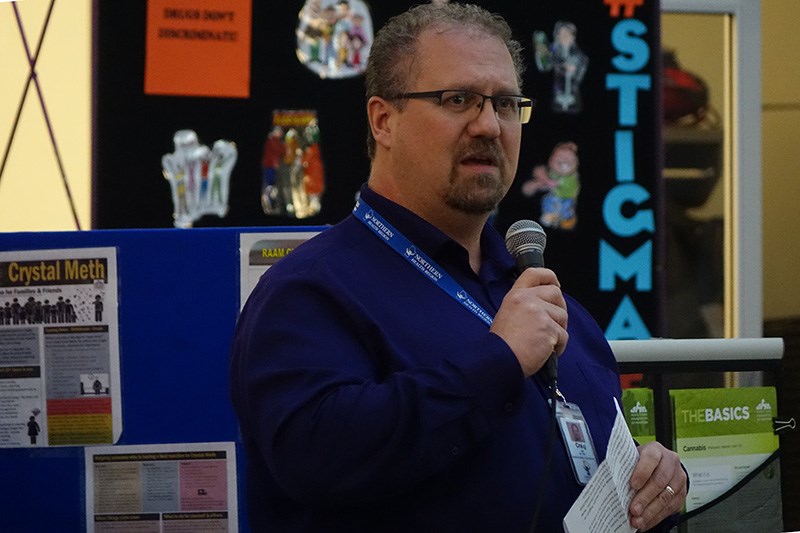The Addictions Foundation of Manitoba (AFM), the Northern Regional Health Authority (NRHA) and the Safer Choices Northern Network (SCNN) held an information fair and screened a documentary on the overdose crisis in Canada at the Thompson Regional Community Centre Nov. 25 as part of Manitoba Substance Use and Addiction Awareness Week (MSUAAW).
AFM northern director Gisele DeMeulles said the collaborative nature of the event reflected the way substance use and addictions treatment is delivered in Northern Manitoba.
“Although we have a lot of resources in the north, we have really made an effort to work together to try and bridge some of those gaps” she said, reading a proclamation from Mayor Colleen Smook declaring Nov. 25-29 as MSUAAW in the City of Thompson. “We’re very lucky and fortunate that our city council takes the issue of addiction very seriously as well and works with the Addictions Foundation of Manitoba in Thompson and in the north.”
Craig Hillier, the NRHA executive director of clinical services, said the health authority supports substance users and people with addictions in a variety of ways.
“Over the past three years… we’ve distributed about $100,000 worth of harm reduction equipment,” he said. “We have helped fund the RAAM [rapid access to addictions medicine] clinic which to date has seen pretty close to 200 patients.”
He also said part of what the NRHA tries to do is provide avenues for people using substances and those with addictions to tell them what they need. That represents somewhat of a shift in society’s view of addictions over the past few decades.
“We really used to be a culture of blame, a culture of fear and now we’re emerging into a much better culture of support, of caring, of providing services, of helping,” said Hillier. “Everybody here has known or knows somebody or has loved or loves somebody that has used drugs and we’ve really got ourselves on a much better path and we’re really looking forward to working together with all the partners that are assembled here to continue to help people in our communities.”
RAAM clinic nurse Mary Beaudry said the facility, which celebrated the first anniversary of its opening in October, has been busy.
“Last month I had 135 office visits,” she said. “I’ve had over 200 patients in the whole time of RAAM so it’s been quite a few. It’s been busy but it’s a good thing. It’s good busy.”
Physicians are only physically present at the clinic for a few hours two days a week, but Beaudry says there are lots of services she can provide without them.
“I can offer withdrawal management as long as we have a bed. I can offer treatment services. They have a counsellor with me. They can see me as many times as they want so people might not want to get into actual services but they just want the medications for their treatment and a little bit of talk therapy and they can do that with me.”
The documentary “The Flood” was shown at the TRCC at 5 p.m. and 6:30 p.m. and safe drug supplies were available at the information fair.




